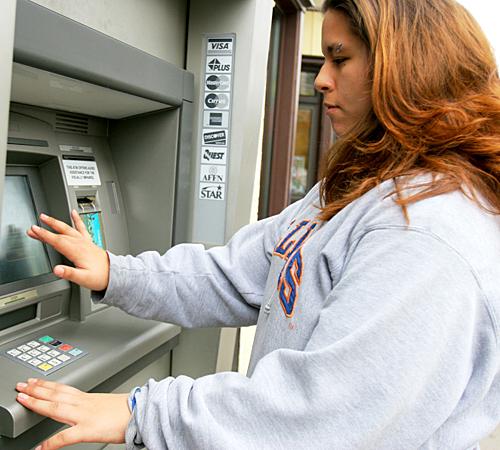Students struggle to juggle debt, finances

Melissa Rodriguez, freshman in ACES, checks her balance at a Chase ATM located on Daniel Street on Thursday. “I am worried about catching up with my bills after I graduate,” Rodriguez said. Rodriguez, like many other students, uses financial ai Beck Diefenbach
April 20, 2007
Two months into her first semester at the University, Sara Schroeder, freshman in LAS, had gone through all of the $700 she brought to campus.
Schroeder said that now she does not make large purchases or buy clothes so she has enough to last the school year.
“I usually spend money on small things like hot chocolate from a coffee shop, but in the end, it all still adds up,” Schroeder said.
While Schroeder has only been struggling for one year to get a handle on her finances, some students on campus struggle to manage their money throughout their entire education.
“We see people that have many problems, who have credit card debt, that don’t ask for help until it’s too late,” Financial Aid Director Dan Mann said.
Get The Daily Illini in your inbox!
But the University does not offer workshops or programs specifically aimed at helping students manage their money.
While the Office of Student Financial Aid does offer counseling, as well as budget worksheets and other resources through its Web site, it can only help students deal with education-based debt.
Mann said education-based debt often happens because financial aid packages cannot compensate for rising tuition. He said students should apply for as much financial aid they can qualify for and he encouraged students to fill out a FAFSA every year.
Both Mann and Angela Lyons, associate professor in the Agricultural and Consumer Economics Department, said students need to understand how loans work if they choose to use them to fund their education.
“Think about how much you can realistically borrow,” she said. “Think about if you will have the salary to make those payments and also what kind of lifestyle you plan to live.”
Because private loans have higher interest rates, they can be more difficult to pay off, Lyons said.
She also said students should avoid using credit to pay off tuition and fees since interest adds up quickly on credit cards.
In terms of non-educational debt, Mann said students should access information posted on the Office of Student Financial Aid’s Web site for more information.
Lyons said budgeting is key and suggested students use online budget calculators to keep track of how much they have and how much they spend, especially when they have credit cards or debit cards.
“Don’t just keep swiping,” Jenita Johnson, sophomore in ACES, said. “It’s all about self-control. Get (a card) with a small limit so it’ll be affordable and easy to pay off.”
Lyons said credit cards are beneficial because they allow students to build credit early. But if students don’t pay their bills on time or only pay the minimum monthly payment, it can ruin their credit score and prevent them from buying a car, renting an apartment, or even getting a job later in life.
Bad credit and excessive debt can also impact students’ romantic lives.
“I had a student recently come to me and say, ‘My fiancee won’t marry me because of my credit card debt!'” Lyons said.
To avoid debt in general, Johnson said students should practice self-control and curb urges to impulse-shop.
Tips on managing your money
- Find roommates to share living expenses with.
- Clip and use coupons.
- Eat at cheaper places when dining out, and cook at home.
- Stop making new charges, and pay with cash.
- Try to pay more than the minimum balance on credit cards.
- Transfer balances to low-interest rate cards.
Source: Dr. Angela Lyons, Editor of Journal of Consumer Education






